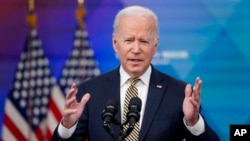U.S. President Joe Biden answered Ukraine’s plea for help Wednesday with an $800 million assistance package that includes a range of weapons and defensive gear. However, the assistance fell short of the no-fly zone that Ukrainian President Volodymyr Zelenskyy seeks as his country faces continued attacks from Russia.
“That brings the total of new U.S. security assistance to Ukraine to $1 billion just this week,” Biden said, adding: “This new package on its own is going to provide unprecedented assistance to Ukraine. It includes 800 anti-aircraft systems to make sure the Ukrainian military can continue to stop the planes and helicopters that have been attacking their people and to defend their Ukrainian airspace.”
In addition to the 800 Stinger anti-aircraft systems that Biden mentioned, the package includes 2,000 Javelin and 1,000 light anti-armor weapons and 6,000 AT-4 anti-armor systems; hundreds of grenade launchers, shotguns and machine guns; thousands of rifles and pistols; more than 20 million rounds of ammunitio; and tens of thousands of sets of body armor and helmets.
The new U.S. assistance package followed an impassioned plea that Ukraine’s president made Wednesday to U.S. lawmakers, begging them to do more to protect his nation amid a three-week onslaught by Russian forces.
In his speech, Zelenskyy evoked some of the worst traumas of American history to ask Congress and Biden to give more military assistance and impose a no-fly zone over Ukraine’s besieged cities.
“Right now, the destiny of our country is being decided,” Zelenskyy said, speaking virtually to a packed session of U.S. lawmakers in a speech that evoked the painful memories of Japan’s 1941 attack on Pearl Harbor, which spurred the U.S. to enter World War II; and the September 11, 2001, terror attacks, which launched the U.S.’ multifront, two-decade-long global war on terrorism.
The 44-year-old actor-turned-president, who spoke in English for part of his address, also raised the more inspiring parts of American history, including the words of civil rights leader Martin Luther King Jr.
'I need your decision'
“I need to protect our sky,” Zelenskyy said. “I need your decision, your help, which means exactly the same, the same you feel when you hear the words ‘I have a dream.’ ”
He reiterated his request for a no-fly zone, a request the White House has said would put the U.S. into direct confrontation with Russia.
Instead, Washington is pursuing what officials say are harsh and effective sanctions against Russia, with a special focus on the wealthy elites who surround Putin. To that end, U.S. Treasury Secretary Janet Yellen and Attorney General Merrick Garland met virtually on Wednesday with officials from Australia, Canada, Germany, France, Italy, Japan, the United Kingdom and the European Commission to launch the Russian Elites, Proxies and Oligarchs multilateral task force.
Russian President Vladimir Putin seems to be unfazed by the opposition and told Russian media on Wednesday that he would continue what he has described as a “special operation” in Ukraine.
“The West is trying to convince its citizens that their difficulties are the result of Russia’s actions, but this is a lie,” Russian media reported Putin as saying.
NATO Secretary-General Jens Stoltenberg said ministers meeting in Brussels had agreed that the alliance must continue to provide significant support to Ukraine, including military supplies, financial help and humanitarian aid. He also called on Russia to stop its attacks on Ukraine.
Earlier, U.S. Defense Secretary Lloyd Austin highlighted support for Ukraine’s ability to defend itself as well as U.S. commitment to aid any NATO ally that comes under attack.
Condemnation of Russia
“I think our presence here sends a signal to the world that we remain united in our support of Ukraine, and we condemn Russia’s unprovoked and unjustified invasion into Ukraine,” Austin said.
Russia has objected to NATO’s presence near its borders and sought a guarantee that Ukraine would never join the alliance. NATO insists countries are free to make their own decisions about security ties.
While Ukraine is not part of NATO, seven NATO countries share borders with Russia, Ukraine or Russian ally Belarus, and that proximity has raised concerns of a wider conflict.
U.S. Defense Secretary Lloyd Austin, center, speaks with NATO Secretary-General Jens Stoltenberg, front second left, during the North Atlantic Council meeting of NATO defense ministers at NATO headquarters in Brussels, March 16, 2022. Stoltenberg has made it clear that the 30-nation military alliance is set to radically change its security stance in Europe in response to Russia's war on Ukraine.
Stoltenberg said Wednesday that there were 100,000 U.S. troops in Europe and another 40,000 troops under direct NATO command, as well as hundreds of thousands more on heightened alert across NATO nations.
Biden is due to join other NATO leaders in Brussels for a summit March 24, marking one month since Russia launched its invasion after denying for months it planned to do so.
On the ground in Ukraine, the country’s emergencies agency reported a 12-story residential building was among the targets hit by Russian forces. Ukrainian officials also said Russia bombed a theater in Mariupol where hundreds of people were taking shelter.
Hints at progress
Negotiations between Russia and Ukraine had continued Tuesday, and while previous rounds yielded no major breakthroughs, Zelenskyy said in a video message early Wednesday that there were some signs of progress.
"The meetings continue, and, I am informed, the positions during the negotiations already sound more realistic. But time is still needed for the decisions to be in the interests of Ukraine,” he said.
Zelenskyy suggested a compromise on Tuesday, saying Ukraine was ready to accept security guarantees that fall short of its goal to join NATO.
Kremlin spokesperson Dmitry Peskov said it was premature to predict whether the peace talks would lead to progress.
VOA's White House Bureau Chief Patsy Widakuswara, National Security Correspondent Jeff Seldin and Congressional Correspondent Katherine Gypson contributed to this report. Some information came from The Associated Press, Agence France-Presse and Reuters.




